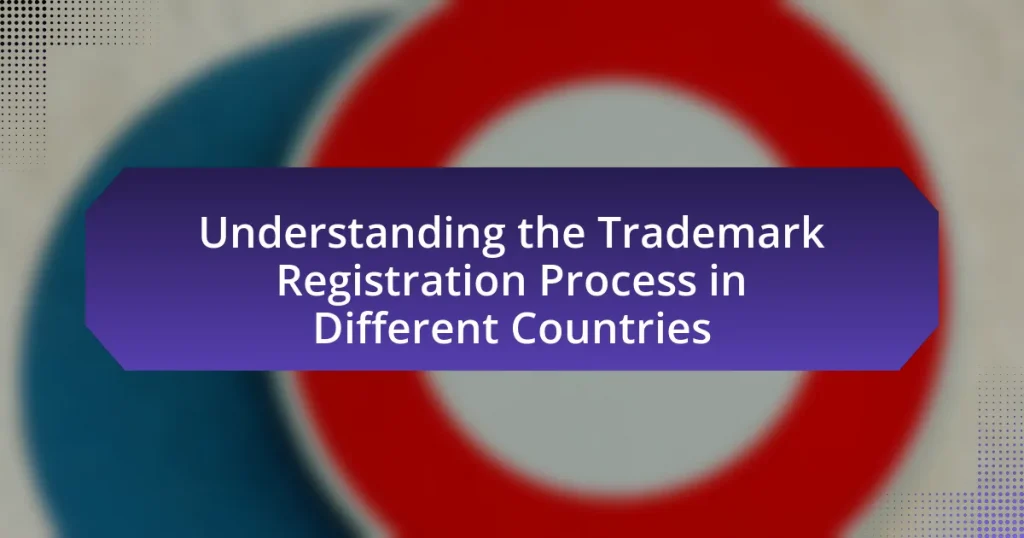Evaluating the value of a trademark in business transactions is a critical process that assesses its worth based on factors such as brand recognition, market position, and revenue potential. This evaluation is essential for informed decision-making in trademark licensing, sales, and mergers and acquisitions, as strong trademarks can significantly enhance a company’s market value. The article explores the importance of trademark valuation, the factors influencing it, the methods used for assessment, and the practical applications in business transactions, while also addressing challenges and best practices for effective valuation. Additionally, it highlights the role of legal considerations and market dynamics in shaping trademark value.

What is Evaluating the Value of a Trademark in Business Transactions?
Evaluating the value of a trademark in business transactions involves assessing its worth based on factors such as brand recognition, market position, and potential for generating revenue. This evaluation is crucial for determining the financial implications of trademark licensing, sales, or mergers and acquisitions. For instance, a study by the International Trademark Association found that strong trademarks can significantly enhance a company’s market value, often accounting for a substantial portion of its overall worth. This underscores the importance of accurately valuing trademarks to inform strategic business decisions.
Why is trademark valuation important in business transactions?
Trademark valuation is important in business transactions because it quantifies the financial worth of a brand’s intellectual property, influencing negotiations and strategic decisions. Accurate valuation helps businesses assess the potential return on investment, determine fair pricing during mergers and acquisitions, and establish licensing agreements. For instance, a study by the International Trademark Association found that brands contribute significantly to company value, with some estimates suggesting that trademarks can account for up to 80% of a company’s market value. This underscores the necessity of understanding a trademark’s value to maximize financial outcomes in business dealings.
What role does a trademark play in a company’s brand identity?
A trademark serves as a critical component of a company’s brand identity by distinguishing its goods or services from those of competitors. This differentiation fosters brand recognition and loyalty among consumers, as trademarks often embody the quality and reputation associated with a company’s offerings. For instance, a study by the International Trademark Association found that 79% of consumers are more likely to purchase a product if they recognize its trademark, highlighting the importance of trademarks in shaping consumer perceptions and driving purchasing decisions.
How can trademark value impact business negotiations?
Trademark value significantly impacts business negotiations by influencing the perceived worth of a company and its assets. A strong trademark can enhance a company’s market position, making it more attractive to potential partners or buyers. For instance, a study by the International Trademark Association found that companies with well-recognized trademarks can command a premium in negotiations, often resulting in higher valuations during mergers and acquisitions. This is because trademarks represent brand equity, customer loyalty, and market differentiation, which are critical factors in determining a company’s overall value in business transactions.
What factors influence the value of a trademark?
The value of a trademark is influenced by factors such as brand recognition, market position, legal protection, and the potential for future earnings. Brand recognition significantly enhances a trademark’s value, as consumers’ familiarity with a brand can lead to increased sales and customer loyalty. Market position reflects the trademark’s competitive advantage within its industry, which can affect its desirability and pricing. Legal protection, including registration and enforcement of rights, safeguards the trademark against infringement, thereby maintaining its value. Lastly, the potential for future earnings, often assessed through projected revenue streams associated with the trademark, plays a crucial role in determining its overall worth.
How does market recognition affect trademark valuation?
Market recognition significantly enhances trademark valuation by increasing consumer trust and brand loyalty. When a trademark is widely recognized, it often commands a premium in the marketplace, as consumers are more likely to choose familiar brands over unknown ones. For instance, a study by the International Trademark Association found that well-recognized trademarks can increase a company’s market share by up to 20%, directly impacting its overall valuation. This correlation between market recognition and trademark value underscores the importance of brand visibility and reputation in business transactions.
What is the significance of trademark registration status?
Trademark registration status is significant because it establishes legal ownership and exclusive rights to use a trademark in commerce. This legal recognition provides protection against unauthorized use by others, which can prevent brand dilution and infringement. Furthermore, registered trademarks can enhance a business’s value in transactions, as they are considered intangible assets that can be bought, sold, or licensed. According to the United States Patent and Trademark Office, registered trademarks can also provide the owner with the ability to sue for damages in federal court, reinforcing the importance of registration in safeguarding a brand’s identity and market position.
What methods are used to evaluate trademark value?
Methods used to evaluate trademark value include the cost approach, market approach, and income approach. The cost approach assesses the expenses incurred in creating or acquiring the trademark, while the market approach compares the trademark to similar trademarks that have been sold or licensed. The income approach estimates the future income attributable to the trademark, discounted to present value. These methods are widely recognized in the field of intellectual property valuation and are often used in business transactions to determine a trademark’s worth accurately.
What are the income-based approaches to trademark valuation?
Income-based approaches to trademark valuation primarily include the Income Approach and the Relief from Royalty Method. The Income Approach estimates the value of a trademark based on the expected future income it will generate, often using discounted cash flow analysis to project revenues and expenses associated with the trademark. The Relief from Royalty Method specifically calculates the value by determining the royalties that would be saved if the trademark were owned rather than licensed, applying a discount rate to future royalty savings to arrive at a present value. These methods are widely accepted in the field of intellectual property valuation, supported by industry practices and guidelines from organizations such as the International Valuation Standards Council.
How do market-based approaches differ in trademark valuation?
Market-based approaches in trademark valuation differ primarily in their reliance on actual market transactions compared to other valuation methods. These approaches assess the value of a trademark based on comparable sales, licensing agreements, or market data, reflecting the price that similar trademarks have fetched in the marketplace. For instance, the market approach may utilize data from recent sales of trademarks in the same industry to establish a benchmark value, while income or cost approaches focus on projected future earnings or the costs incurred to develop the trademark. This reliance on real-world transactions provides a tangible basis for valuation, making it particularly relevant in business transactions where actual market behavior is a key indicator of value.
How can businesses prepare for trademark valuation?
Businesses can prepare for trademark valuation by conducting a comprehensive audit of their intellectual property portfolio. This audit should include identifying all registered and unregistered trademarks, assessing their usage in commerce, and evaluating their market position. According to the International Trademark Association, a thorough understanding of the trademarks’ relevance and strength in the marketplace is crucial for accurate valuation. Additionally, businesses should gather financial data related to the trademarks, such as revenue generated from products or services associated with the marks, to provide a quantitative basis for valuation. This preparation ensures that businesses present a clear and substantiated case for the value of their trademarks during transactions.
What documentation is necessary for an accurate valuation?
An accurate valuation of a trademark requires comprehensive documentation, including the trademark registration certificate, financial statements, market analysis reports, and any licensing agreements. The trademark registration certificate establishes legal ownership and protection, while financial statements provide insights into revenue generated by the trademark. Market analysis reports assess the trademark’s position within the industry, and licensing agreements reveal potential income streams. Collectively, this documentation supports a well-rounded valuation by offering legal, financial, and market context.
How can businesses enhance their trademark’s perceived value?
Businesses can enhance their trademark’s perceived value by investing in brand reputation and consumer trust. A strong brand reputation, built through consistent quality, effective marketing, and positive customer experiences, directly influences how consumers perceive a trademark. For instance, companies like Apple and Nike have cultivated strong brand identities that command premium pricing, demonstrating that a well-regarded trademark can significantly increase perceived value. Additionally, businesses can protect their trademarks through legal measures, ensuring exclusivity and reducing the risk of dilution, which further solidifies consumer confidence and enhances value.

What challenges are associated with trademark valuation?
Trademark valuation faces several challenges, primarily due to the subjective nature of brand perception and market dynamics. The difficulty in quantifying intangible assets like brand reputation and customer loyalty complicates the valuation process. Additionally, fluctuating market conditions and varying methodologies for valuation, such as the income, market, and cost approaches, can lead to inconsistent results. For instance, a study by the International Trademark Association highlights that 70% of companies struggle with establishing a reliable valuation method, underscoring the complexity of accurately assessing a trademark’s worth.
What common pitfalls should businesses avoid during valuation?
Businesses should avoid overestimating future cash flows during valuation. This common pitfall can lead to inflated valuations that do not reflect realistic market conditions. For instance, relying on overly optimistic projections without considering market trends or historical performance can skew the valuation process. Additionally, neglecting to account for potential risks, such as regulatory changes or competitive pressures, can further distort the valuation. Accurate valuation requires a balanced approach that incorporates both potential growth and inherent risks, ensuring a more reliable assessment of a trademark’s value in business transactions.
How can subjective assessments impact trademark value?
Subjective assessments can significantly impact trademark value by influencing perceived brand strength and marketability. These assessments often stem from consumer perceptions, brand reputation, and emotional connections, which can lead to variations in how a trademark is valued in business transactions. For instance, a trademark associated with positive consumer experiences may command a higher price due to its perceived goodwill, while negative assessments can diminish its value. Research indicates that brands with strong emotional connections can achieve up to 3.5 times higher market value compared to those without such connections, highlighting the tangible effects of subjective evaluations on trademark worth.
What are the risks of overvaluation or undervaluation?
Overvaluation and undervaluation of trademarks pose significant risks in business transactions. Overvaluation can lead to inflated expectations, resulting in poor investment decisions and potential financial losses if the trademark does not generate anticipated revenue. Conversely, undervaluation may cause a business to miss out on potential profits or fail to secure adequate funding, as stakeholders may perceive the trademark as less valuable than it truly is. Historical data shows that companies that misjudge trademark value often face legal disputes and diminished market competitiveness, underscoring the importance of accurate valuation in maintaining brand integrity and financial health.
How do legal considerations affect trademark valuation?
Legal considerations significantly impact trademark valuation by influencing the perceived strength and enforceability of the trademark. Stronger legal protections, such as registered trademarks, enhance a trademark’s value due to the exclusive rights granted, which can deter infringement and increase market presence. For instance, a trademark that is actively enforced through litigation or opposition against infringers demonstrates its value, as it signals to potential buyers or investors that the trademark is a viable asset. Additionally, legal considerations such as the trademark’s geographic scope, duration of protection, and any existing disputes can further affect its valuation, as these factors determine the trademark’s marketability and potential revenue generation.
What role do trademark disputes play in valuation processes?
Trademark disputes significantly impact valuation processes by introducing uncertainty and potential financial liabilities. When a trademark is involved in a dispute, its perceived value can decrease due to the risk of litigation costs, potential damages, and the possibility of losing trademark rights. For instance, a study by the International Trademark Association found that companies facing trademark disputes often see a decline in brand equity, which directly affects their market valuation. Additionally, the outcome of such disputes can alter the competitive landscape, further influencing the valuation of the trademark in business transactions.
How can changes in trademark law influence value assessments?
Changes in trademark law can significantly influence value assessments by altering the legal protections and market exclusivity associated with a trademark. For instance, a shift towards stricter enforcement of trademark rights can enhance the perceived value of a brand, as it may reduce the risk of infringement and increase consumer trust. Conversely, changes that weaken trademark protections, such as the introduction of more lenient standards for generic terms, can diminish brand value by allowing competitors to use similar marks, thereby diluting brand identity. Historical examples include the Lanham Act in the United States, which established federal trademark protections and subsequently increased the market value of registered trademarks by providing a clear legal framework for enforcement.

What are the practical applications of trademark valuation in business transactions?
Trademark valuation has several practical applications in business transactions, including mergers and acquisitions, licensing agreements, and financial reporting. In mergers and acquisitions, accurate trademark valuation helps determine the overall worth of a company, influencing negotiation strategies and purchase prices. For licensing agreements, businesses can establish fair royalty rates based on the trademark’s value, ensuring equitable compensation for the use of intellectual property. Additionally, in financial reporting, companies must assess the value of their trademarks for balance sheets and compliance with accounting standards, which can impact investor perceptions and stock valuations. These applications underscore the importance of trademark valuation in facilitating informed decision-making and strategic planning in business transactions.
How can trademark valuation inform mergers and acquisitions?
Trademark valuation can significantly inform mergers and acquisitions by providing a quantifiable assessment of a brand’s worth, which influences negotiation strategies and deal structures. Accurate valuation helps acquirers understand the potential return on investment and the strategic fit of the trademark within their existing portfolio. For instance, a study by the International Trademark Association found that brands with strong trademarks can command a premium in acquisition deals, often leading to higher overall valuations. This data underscores the importance of trademark valuation in assessing both tangible and intangible assets during the M&A process, ultimately guiding decision-making and risk assessment.
What strategies can be employed to leverage trademark value in negotiations?
To leverage trademark value in negotiations, businesses can employ strategies such as establishing brand equity, conducting thorough market analysis, and utilizing trademark licensing. Establishing brand equity involves demonstrating the trademark’s recognition and reputation, which can enhance its perceived value during negotiations. Conducting thorough market analysis provides insights into competitive positioning and consumer perception, allowing negotiators to present data that supports the trademark’s worth. Utilizing trademark licensing can create additional revenue streams and showcase the trademark’s potential for generating income, further solidifying its value in negotiations. These strategies are effective as they provide concrete evidence of the trademark’s significance and potential impact on business success.
What best practices should businesses follow for effective trademark valuation?
Businesses should follow systematic approaches for effective trademark valuation, including conducting thorough market research, utilizing appropriate valuation methods, and regularly updating valuations. Market research helps identify the trademark’s position and potential in the marketplace, which is crucial for accurate valuation. Common valuation methods include the income approach, which estimates future earnings attributable to the trademark, the market approach, which compares similar trademarks, and the cost approach, which assesses the expenses incurred in developing the trademark. Regular updates are essential due to changing market conditions and brand performance, ensuring that the valuation reflects current realities. These practices are supported by the International Trademark Association, which emphasizes the importance of accurate and timely trademark valuations for informed business decisions.
How often should businesses reassess their trademark value?
Businesses should reassess their trademark value at least annually. Regular reassessment is essential due to factors such as market changes, brand performance, and competitive landscape shifts, which can significantly impact a trademark’s worth. For instance, a study by the International Trademark Association indicates that brands can lose up to 30% of their value if not regularly evaluated and updated to reflect current market conditions. This annual review helps businesses make informed decisions regarding branding strategies, licensing agreements, and potential sales or acquisitions.
What resources are available for businesses seeking trademark valuation assistance?
Businesses seeking trademark valuation assistance can access several resources, including specialized valuation firms, legal experts, and online valuation tools. Valuation firms, such as Integra Realty Resources and Brand Finance, provide professional assessments based on market data and industry standards. Legal experts, particularly those specializing in intellectual property, can offer insights into the legal implications and marketability of trademarks. Additionally, online tools like the Trademark Valuation Calculator from the International Trademark Association can help businesses estimate the value of their trademarks using established methodologies. These resources collectively enable businesses to obtain accurate and reliable trademark valuations essential for transactions and strategic planning.



